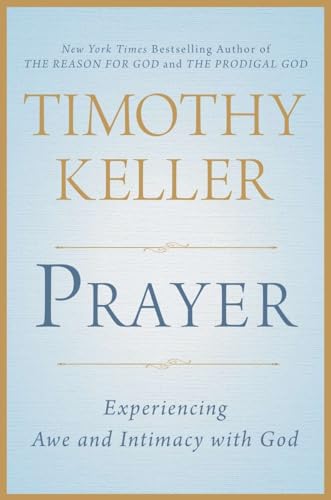Prayer: Experiencing Awe and Intimacy with God
Written by Timothy Keller Reviewed By Matthew W. ManryPastor Timothy Keller has continued his excellent trend of providing both practical and theologically sound material for Christians. In this book, Keller explores the topic of prayer by analyzing the theological, experiential, and methodological aspects of this practice (p. 1). Keller is clear from the outset about his intended goal. He notes, “This book will show that prayer is both conversation and encounter with God” (p. 5).
In part 1, Keller discusses the importance of desiring to pray. He says: “We are not called to choose between a Christian life based on truth and doctrine or a life filled with spiritual power and experience. They go together” (pp. 16–17). This is one of the main arguments of the book. As Christians, we should see religious experience and sound theology standing in concord rather than as conflicting opponents. According to Keller, “Prayer is awe, intimacy, struggle—yet the way to reality. There is nothing more important, or harder, or richer, or more life altering” (p. 32). Simply put, prayer is a way of life.
Part 2 focuses on understanding prayer. One of the greatest insights from this section was when Keller says: “Prayer is continuing a conversation that God has started through his Word and his grace, which eventually becomes a full encounter with him” (p. 48). This is why Christians must be immersed in God’s Word constantly. Knowledge of the Word enables Christians not only to meet with God but also to encounter Him. As Keller notes, “Prayer turns theology into experience” (p. 80).
In part 3, Keller considers the importance of learning how to pray. By discussing some of the great works on prayer by Augustine of Hippo, John Calvin, and Martin Luther, Keller shows how Christians can benefit from reading and meditating on the words of wisdom handed down from these great Christian teachers. These chapters are invaluable and are worth extended reflection. Keller then shifts to a very practical discussion of the Lord’s Prayer. Keller dissects the prayer section by section and shows why Christians would be wise to keep Matthew 6:9–13 central in their lives. Keller concludes this section with a brief overview of what prayer entails and what it does to us as we are engulfed in its practice.
Part 4 focuses on deepening prayer. In this section, Keller discusses Christian meditation. He says, “Meditation is spiritually ‘tasting’ the Scripture—delighting in it, sensing the sweetness of the teaching, feeling the conviction of what it tells us about ourselves, and thanking God and praising God for what it shows us about him” (p. 151). In chapter 11, Keller expounds more upon the notion that truth and experience can stand together. This is an extremely important chapter and one that could be read and reread profitably.
Part 5 concludes with a practical discussion of prayer. In this section Keller discusses three basic kinds of prayer. Upward prayer is praise and thanksgiving that focuses on God himself. Inward prayer focuses on self-examination and confession of sin. Outward prayer focuses on supplication and intercession (p. 189). Chapters 12, 13, and 14 specifically focus on these three modes of prayer, and readers would be wise to absorb what Keller has to say in these chapters. In chapter 15, Keller discusses the importance of daily prayer and concludes by offering up practical plans on how to make prayer a daily exercise.
In summary, Keller has done both believers and non-believers a great service in providing them with such a practical and yet theologically rich book on the importance and nature of prayer. One of the most unique things about Keller’s book is his discussion of Christian mysticism. In Reformed circles this is not discussed often and is usually viewed as taboo. As Keller rightly notes, “many Protestants are hesitant about spiritual experience” (p. 183). Nevertheless, Keller presents valid reasons as to why Christians should be open to experiencing God through prayer and Bible reading. He says, “The irony is that many conservative Christians, most concerned about conserving true and sound doctrine, neglect the importance of prayer and make no effort to experience God, and this can lead to eventual loss of sound doctrine” (p. 180). Keller’s challenge to Christians to be open to experiencing a sound biblical mysticism is extremely valuable and needed.
Almost everything that Keller discusses in Prayer: Experiencing Awe and Intimacy with God is thorough and in-depth. On the whole, Tim Keller truly has offered readers a remarkable and well-rounded discussion of prayer. He succeeds in discussing the theological, experiential, and methodological practices of prayer, and he does so with grace and clarity. Christians would be wise to read this book, and then to come back to it again and again as they continue on their spiritual journey.
Matthew W. Manry
Matthew W. Manry
Life Bible Church
Canton, Georgia, USA
Other Articles in this Issue
Stephen Williams raises a number of concerns with the book, Adam, the Fall, and Original Sin...
The book of Job is an obvious place to turn when a Christian suffers, but it is not easy to discern what God means to teach his people through this difficult book...







